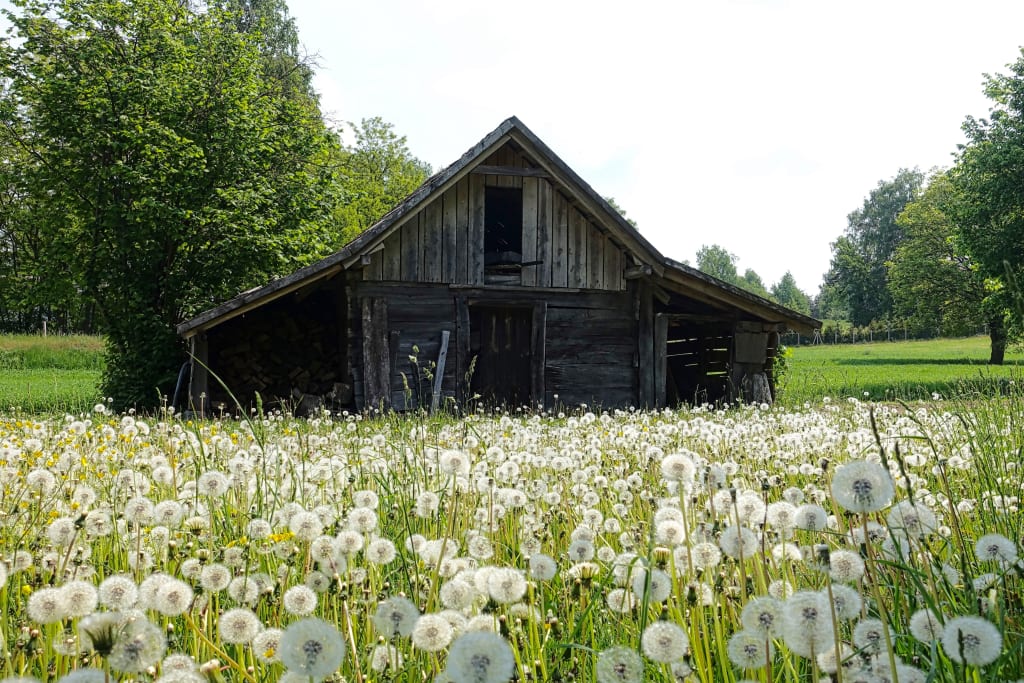The Patient's Plea
Variation on a Theme of Forbidden Grief

I
As the day came to bloom, one Grace Swanson washed herself in the tide of the sun’s last cadences before it left for the wings. Its grandiose, vermillion light let the walls of her hospital room possess a warm fragrance of meditation, kept in time only by the audible measure of her heartrate. Such tranquillity as this was enough to beckon a knowing smile from the elderly woman, expelling the creases in her face only to accentuate her eyes – a rare shade of sapphire - and indulging in a particular kind of elusive harmony that can only be found in one’s own company.
It could quite accurately be said that Mrs Swanson had a most orchestral classification of character – something that was seldom seen to continue into old age, for lack of opportunity more than anything. In the early haze of morning, she would be delicate as woodwind; by the turn of the day, she carried herself with the careless fluency trapped in strings; and beyond the hour of 4pm, she would often find jovial cause to oscillate between rambunctious brass and the directional sense of purpose endowed in percussion. Moreover, whilst taking inventory of Grace, it must be said that the beauty which accompanied her all the while could not justifiably be neglected. Cascades of blonde sat at her shoulders for most of her life, and her ruby lips could give such promises in beams as to leave otherwise stoical men hypnotised, stallions to the bugle. Younger, more reckless days before had placed a high value on these features, and made her companionship a precious commodity in the eyes of her contemporaries. More impressive still, it was often remarked that one could only hate her for such factors until you’d met her, owing to a genuine care of and an infectious desire to laugh with those around her. Such was the charisma that had led her by the hand through life.
And yet, it was in the present that she now lay, alone, in a different kind of peace. Whatever time had chipped away in the form of youthful beauty, it had replenished in excess in the swathes of dignity that hovered with her. Bound to her bed, she had to exercise new pass-times, being moved as well as moving others. Within a week of her admittance, she had become a personal favourite of the hospital staff, with fearsome wit, a penchant for storytelling, and a past replete with all manner of tales. The unspoken contract which came of this was a markedly saccharine one; Grace would commandeer a few extra biscuits a day, and the staff’s otherwise melancholic employment would be granted momentary unconsciousness with the smooth, peppermint words she so meticulously gave out. This gleeful abandon she made exhibition of on a day-to-day basis, however, came courtesy of one unbearable truth. A sandglass had been overturned on her first admission to hospital, and – serene as her present existence was - Mrs Swanson had an acute feeling that she could count her days on both hands.
It is only when we reach the end of something that we have perspective enough to meditate on what came before, and the favourite patient had done plenty of it. In the absence of interruption, the wall in front of her became the object of her mind’s projection, reanimating fond episodes from a lifetime’s collection, with the vividness that only memory realises, that no string of words can reproduce. And there was one show in particular which was forever in rerun.
A show, which she was keen to revisit in the flesh.
II
“You want to go where, Grace?”
At first, the idea of leaving the hospital had seemed a ridiculous notion to the staff. “If there’s one thing you need, it’s to stay put” came the response from so many stringently trained mouths. But when the straits are particularly dire, our wants and whims become necessity. She could not help but be possessed by this idea, inflated further as it became her only company, and – as with any man or woman in chains – she became the victim of a violent desperation, with this one, unadulterated freedom the only panacea. Rest was a liberty she could not exercise mentally, as it was forced on her physically. Such aspirations only remained pure fantasy until the entrance of a Louise LaHarte.
The young woman was Grace’s latest attendant - a trainee - and wore ochre eyes of fortified optimism below streaks of caramel hair. Unbeknownst to her patient, she had lived a life which, in spite of its relative ripeness, had slow danced with grief a few too many times, giving her an empathy unparalleled by anyone of her age. Quite coincidentally, this was a trait which would play out quite perfectly in coming events.
Over the passing days, what had started as a matter of exploitation, developed into a rapport of honest friendship. Beginning as an attempt to prey on Louise’s naivety as a means to escape, Grace had started with the most popular of her aphorisms, fables, and fabliaux, but had come to realise that – being as sympathetic as she was – she required no emotional bribery. The concept of a last request was something so succulently sentimental that Louise could not resist, especially if it would get her into trouble.
III
The occasion was choregraphed to cinematic perfection. Hiring a convertible jaguar of a similar gravitas to its passenger, they rolled over hills as the wind blew ripples into the crops surrounding, and exhilaration unveiled itself in their arms that reached as if to pluck threads from the clouds. The sunset had never found such Parisian insouciance as when it had Bechet to soundtrack, and “Si Tu Vois Ma Mere” loosely bumbled as glazing for its colour – a carefully selected track. In an odd expression of welcome, the trees of their track began to bow as they ran along the meticulous instructions discussed at the hospital, etched so deeply in her memory from a lifetime of mental visitations. Silhouetted many yards ahead lay a rather dilapidated barn, radiant and rustic in the sun’s musings, a relic to be revered for its honesty. Props no longer present began to place themselves on set as the old lady looked ahead, absorbed in its magnetism. Guided by this very force, within moments of the car’s halting, Grace carried herself to the open doors, curtains of the stage. Between them she stood, comfortable in the barn’s embrace. That knowing smile returned once again as her icy eyes unapologetically looked around in infant’s wonder, at precisely nothing. There were a few spatters of hay on the floor, a litter of wooden boxes that appeared the discarded dice of gods, and very little else. The woman found herself in an existence of temporal duality; she was standing in the present, but living in history.
Louise had kept her distance, appreciating the frailty of this vision, but she was compelled to find out more, to awaken in the same dream. “Is this where you met him? Your husband, I mean”. The end of her sentence had the quality of receding back into her mouth as she collapsed in on herself, afraid she had asked too much. And yet, Grace rewarded this exchange with that smile, once so famous, as to reassure her that she was not out of turn. “Not, quite, my dear.” she said, partially breaking the envelope of her reverie with a laugh. Searching slightly, and delicately perching herself on a nearby crate, she passed Louise a look of the utmost sincerity.
“This is where I met her”.
Over the course of the ensuing monologue, the elderly woman acquired her own orbit. Her words accumulated such a gravity that all focus, all objects of the barn, melded into her figure, until Louise found herself seated beside her, held in the air by every clause. Condensing the sentiments of a lifetime into but a few precious moments, she recounted precisely what had happened at this very barn.
She told of how, when at her most popular, she had begun rejecting the advances of boys she had once lived for, without any obvious reason; of how, on one particularly tempestuous evening, a dashing and rather infatuated young man was driving her home from a party down this very lane, and simply could not understand this. In a fit of rage, the boy had cast her into the night’s relentless rain, driving away without remorse as she fumbled her way into the dark, met only by the crackles of lightning, contouring clouds as imposing busts in the sky. She would pause to relive the sense of detachment, adrift in the throes of darkness’ shapeless figures. And then, a moment later, for the solace that accompanied a hand on her shoulder, pulling her to shore in the form of this barn. Much to Grace’s surprise, this unexpected help had come in the form of a young woman, a farmhand. She could not have been more different in appearance. Like perverse mirrors they stood opposite each other, their silence amplified by the rain outside, Grace adorned with a sanguine dress, the woman in dungarees and a faded shirt. Her eyes were bronzed, her hair rough but honeyed, and she brought with her a revelation that Grace had long been awaiting.
They shared a kiss that evening, and Grace remarked that the moment had such clarity as she was yet to find again. Shortly thereafter, the tale took on a more macabre tone. “This was the 40s, you see” euphemistically lay the way for a transition from romance into tragedy, tangible in Grace’s melancholic, unfocused gaze. That summer, so she told, they had indulged in a most unique of affairs for its time; rapt with each other, they had such love as to endow enchantment on the most random of everyday objects, purely for the other’s interaction with it. It was decidedly impossible for her to dispose of a bus ticket from a ride they had shared, let alone something of more intentional emotional weight. The elderly woman sighed, and let the word “but” hit the floor with a thud.
In the years that followed, Grace recounted, it would seem as if their lives were in different time zones. Whilst there was not a drop of outward hostility toward one another, the shared inconvenience, that bit of tangible incongruence, a pining goodnight plea from one as the other begins breakfast, was inexorable. Bitterness at their era wound such coils tighter and tighter, and the spring was to unload itself as its design prophecies. They were horses, tethered unbreakably, but burdened to run half a league separate.
Each of them in turn found conventional families with which they could live out their days appropriately, but they could not continue to keep contact without rekindling what had once been, and an excruciating decision had to be made to go on without. The true pain of this, was that Grace’s lover parted far too young. She had found out some twenty years after she passed on, and it ravaged and rattled her to the very core.
On this note, Grace stood up triumphantly, and strolled to the centre of the barn floor, carrying with her an air of satisfaction as she gazed at the beamed ceiling. Louise sat awash with tears. Things had moved in her that had not done so for a long time, and she sat in the comfort of silence, considering her own past predicaments.
Grace turned to her admiringly, and sighed the sigh of the room from behind a beam.
“And so it is that I must thank you darling, for letting me say a goodbye to my Marie that has long been owed”.
Something jolted somewhere, and a hazy shade of confusion glazed over Louise’s eyes.
“Forgive me, Grace, what did you say her name was?”
“Oh! It was frighteningly pretty, my dear. The woman I loved was one Marie LaHarte.”
About the Creator
Enjoyed the story? Support the Creator.
Subscribe for free to receive all their stories in your feed. You could also pledge your support or give them a one-off tip, letting them know you appreciate their work.






Comments
There are no comments for this story
Be the first to respond and start the conversation.